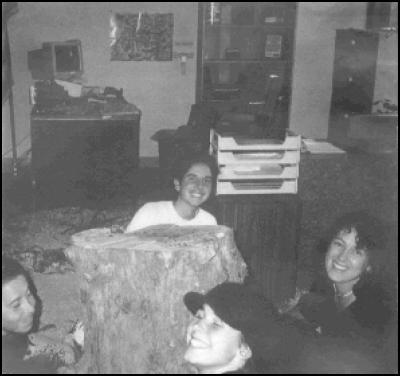Kelpie Wilson: Torture In The Redwoods
Torture In The Redwoods
By Kelpie Wilson
t r u t h o u t | Report
Tuesday 07 September 2004
From: http://www.truthout.org/docs_04/090704A.shtml
This week, in San Francisco, a group of young forest activists will finally get their day in court. In 1997 they were subjected to torture at the hands of police and Pacific Lumber goons. The weapon of torture was the chemical Oleoresin Capsicum, known as pepper spray, swabbed into their eyes with a Q-tip.
In three separate incidents that fall, activists as young as 16 were assaulted as they were chained and helpless. Here is what happened in the words of activist Spring Lundberg: "Humboldt County Sheriff deputies grabbed me by the head and dragged a Q-tip drenched in pepper spray across my eyes. I was completely nonviolent that day, rooted to the floor of Pacific Lumber's lobby like one of the ancient redwoods we defend. PL employees, mingling with law enforcement, told us that we 'had an education coming.' In the lobby of company headquarters in a company town in northern California, they covered the windows with butcher paper so no one could see what they did to us. But the world saw into that room when police videotape of the incident and two others aired on television internationally."

A shocking police video shows deputies swabbing liquid pepper spray directly in the eye of nonviolent protester Jennifer Schneider, whose arms were locked to those of adjacent protesters.

Spring Lundberg and friends locked to a stump in the offices of Pacific Lumber just before they are tortured with pepper spray.
Amnesty International characterized the incidents as "tantamount to torture." The activists sued Humboldt County and the City of Eureka for use of excessive force and the first trial ended in 1998 with a hung jury. The judge attempted to dismiss the case, but appeals court decisions and finally the US Supreme Court have sent the trial back to federal court in San Francisco.
The legal team that won the unprecedented 2002 victory in the civil rights case Judi Bari vs. FBI will argue the case. Attorney J. Tony Serra said, "I'm joining this case in smoldering anger because applying the noxious pepper spray was torture. This case will be vigorously prosecuted and it will be a political trial, and I'm proud of it."
The case has national implications. Police use of pepper spray has escalated since the early 1990's. Originally introduced for use in subduing violent, out of control detainees, police and prison guards are increasingly using it as pure punishment for prisoners whose race, social class or political beliefs they don't like.
Manufacturers say it can be safely used as a spray from fifteen feet away, but cops are spraying people directly in the face with it, soaking their clothes in it and dripping it into their eyes. Experts say it causes pain "like bobbing for fries in a vat of hot oil."
As many as 35 people have died in California after being pepper-sprayed, according to the ACLU. Though pepper spray alone has not been known to kill, in combination with other health conditions it can be deadly. For instance, some pepper-sprayed victims with asthma or bronchitis have died from asphyxiation.
Plaintiffs had attempted to settle the case with Humboldt County, asking only that law enforcement change their policy of using chemical agents on non-violent protesters, but the county refused to settle.
One has to ask why an impoverished, rural, northern California county would be willing to go to the mat on this issue and spend potentially millions of dollars in legal fees. I asked Alicia Littletree, a member of the plaintiff's legal team this question. Her short answer was: "It's law enforcement closing ranks. They always do this in cases of excessive force."
But there is also the reality of the Redwood Empire. Humboldt County and its law enforcement apparatus have traditionally been at the service of Big Timber.
Littletree outlined events during the summer of 1997 that led to the escalation of violence against the protesters: "The Headwaters deal was about to be finalized and Hurwitz didn't need the protesters to drive up the price anymore. The giant rally at Carlotta where 3,000 people were arrested really angered the sheriffs."
The Headwaters deal paid a half billion taxpayer dollars to Charles Hurwitz of Pacific Lumber Company in exchange for about 7,500 acres of redwood forest. PL also got a license to log the rest of their holdings with impunity. Environmentalists were unhappy with the deal.
Littletree also described an incident that took place just a month before the pepper spray assaults that may be connected in some sick way. Charles Hurwitz was at Pacific Lumber headquarters (normally the Texas financier lurks around his Maxxam headquarters in Houston) for discussions about the Headwaters deal. Emerging from a luncheon meeting, he was greeted by a pie thrower who made contact. Sheriff Lewis, mastermind of the pepper spray strategy, was standing right next to him when it happened.
And so we can make sense of the PL employee's statement to activists locked down in their office a month later that the young people "had an education coming." Banana cream in the eyes would be repaid by fire in the eyes.
In 1998, after the first trial failed to produce a verdict, Humboldt County officials went to POST (Peace Officers Standards and Training), a statewide commission of police officers, to lobby for new standards that would approve the use of pepper spray to torture non-violent protestors. The standards redefined "active" and "passive" resistance to make lock downs a form of active resistance to arrest that qualifies for pepper spray compliance.
In 2002, Bush asked government lawyers for a ruling that set his administration above the rule of law and the Geneva Convention on torture. Just like George Bush, the officials of Humboldt County California insist that torture is an indispensable weapon in their fight against terrorism - in this case, the so-called eco-terrorism of a bunch of teenagers who had the audacity to dump a redwood stump in the middle of corporate offices and chain themselves to it.
The violent assaults against protesters can be construed as proof that what they do is effective. A recent study reported in New Scientist (Aug. 28, 2004) provides corroboration. Jon Agnone, a sociologist at the University Washington analyzed the U.S. green movement from 1960 to 1994 and found that protest was highly effective at forcing new environmental laws. Each protest raised the number of pro-environment bills passed by 2.2 per cent. The most effective tool was disruption. "If you make a big enough disturbance then people have to recognize what you are doing," Agnone said.
But the right to dissent and to petition the government is under sustained attack.
Maya Portugal, a plaintiff who was 16 years old when she was subjected to the pepper spray swabbing said, "Since we filed this case, the civil rights of political activists have only eroded more - with the U.S. Patriot Act, a militarized police presence at political conventions and trade talks - and that makes it all the more important for those of us trying to have a public voice to stand up and protect our health and our rights."
One of my favorite bumper stickers from the Pacific Northwest timber wars is this one: "Earth First! - America's Favorite Speed Bumps." It was produced by loggers and it's really not funny, especially if you have been almost run over by a bulldozer or a logging truck, but I like it because it is so revealing.
The corporate growth machine is ripping through planetary resources like a Hummer on high-octane gas. Sometimes speed bumps are the only thing that slows them down.
Kelpie Wilson is the t r u t h o u t environment editor. A veteran forest protection activist and mechanical engineer, she writes from her solar-powered cabin in the Siskiyou Mountains of southwest Oregon.


 Eugene Doyle: The West’s War On Iran
Eugene Doyle: The West’s War On Iran Richard S. Ehrlich: Deadly Border Feud Between Thailand & Cambodia
Richard S. Ehrlich: Deadly Border Feud Between Thailand & Cambodia Gordon Campbell: On Free Speech And Anti-Semitism
Gordon Campbell: On Free Speech And Anti-Semitism Ian Powell: The Disgrace Of The Hospice Care Funding Scandal
Ian Powell: The Disgrace Of The Hospice Care Funding Scandal Binoy Kampmark: Catching Israel Out - Gaza And The Madleen “Selfie” Protest
Binoy Kampmark: Catching Israel Out - Gaza And The Madleen “Selfie” Protest Ramzy Baroud: Gaza's 'Humanitarian' Façade - A Deceptive Ploy Unravels
Ramzy Baroud: Gaza's 'Humanitarian' Façade - A Deceptive Ploy Unravels